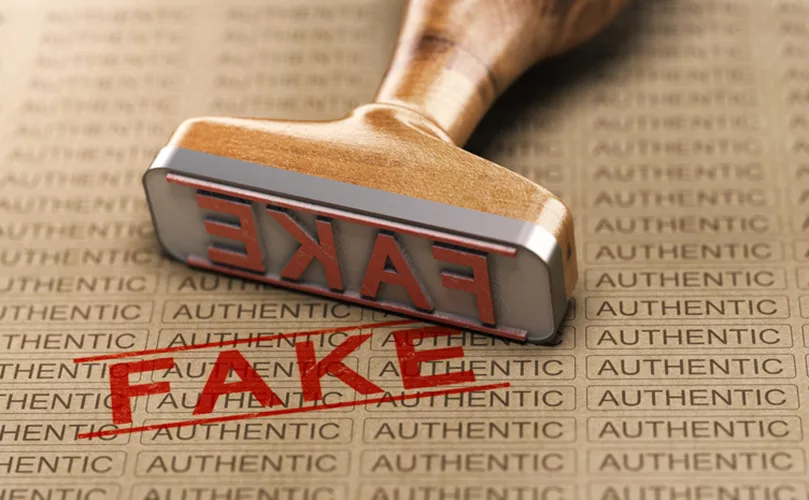Combating the online sale of contraband products continues to be a challenge for plumbing manufacturers and many other businesses. The challenge includes federal de minimis tariff and trade rules that allow counterfeit and contraband goods to slip into the United States under the radar.
Plumbing Manufacturers International (PMI) continues to safeguard the integrity of its members’ products by working with government agencies to curb imports and online sales of counterfeit and contraband products. These efforts build on PMI’s success in advocating for the Integrity, Notification, and Fairness in Online Retail Marketplaces (INFORM) Consumers Act, which improved transparency with online marketplaces and enforcement against noncompliant and counterfeit product sellers.
Plumbing manufacturers invest millions of dollars and thousands of hours to produce high-performance toilets, showerheads and faucets that comply with federal, state and local health and safety standards. Unauthorized contraband fixtures and fittings often do not meet plumbing codes and standards. They typically perform poorly and present health and safety risks, endangering Americans and their families while eroding customers’ trust in the brands PMI members have worked so hard to build.
A top legislative priority for PMI is protecting members’ brand value in online marketplaces such as Amazon, eBay and home improvement retailers. For many years, PMI has coordinated with these marketplaces and various federal and state agencies to identify scammers and mitigate the impact of counterfeit and noncompliant products, trademark violations and intellectual property theft.
The association’s efforts also focus on raising awareness among legislators, policymakers and regulatory officials about the health and performance risks of uncertified contraband plumbing fixtures sold online.
Addressing a rule allowing fake goods to enter the United States undetected, PMI supports changing the federal de minimis rule, which allows packages valued at $800 or less to enter the United States duty- and scrutiny-free. Fraudsters have exploited this rule to import many counterfeit and contraband goods into the country, while overseas companies use the rule to bypass tariffs and taxes American businesses must pay, thus creating an uneven playing field.
U.S. Customs and Border Protection (CBP) reported that de minimis shipments represent 92% of all cargo entering the United States and have steeply risen from 2.8 million a day in 2023 to 4 million a day in 2024 (https://bit.ly/3C93qNd).
To be clear, not all de minimis shipments contain contraband products. In many cases, de minimis shipping exemptions are used to transport urgently needed spare parts or repair materials, along with millions of legitimate products. The challenge is to distinguish which items are legitimate and which are not.
In a September 2024 news release (https://bit.ly/4auQJJc), the Biden-Harris administration called on Congress to “pass legislation to reform the de minimis exemption comprehensively to further protect American consumers, workers, and businesses.” PMI anticipates that the 119th Congress will continue efforts to pass such legislation.
Two bills regarding the de minimis exception were introduced in June 2023 but did not move out of congressional committees. Sen. Bill Cassidy from Louisiana introduced the De Minimis Reciprocity Bill (S. 1969) along with Sen. Tammy Baldwin from Wisconsin and Vice President J.D. Vance, then a senator from Ohio. The legislation would require the U.S. Treasury to review and adjust the U.S. de minimis threshold for each country based on how U.S. imports are treated and taxed.
The Import Fairness Bill (S. 2004), introduced by former Sen. Sherrod Brown of Ohio and co-sponsored by U.S. Secretary of State Marco Rubio, then a Florida senator, seeks to exclude China and certain other countries from using the de minimis exception. The bill, which gained several more co-sponsors, also directs CBP to collect additional information on goods that may qualify for de minimis treatment.
Online retailers and government step up efforts
Many PMI members sell their products on Amazon, which has been adding tools and resources to curb online sales of counterfeit products. Government agencies are advancing their efforts, too.
In 2023, the world’s largest online marketplace reported spending $1.2 billion and employing about 15,000 workers to seize and dispose of more than 7 million counterfeit products worldwide. In addition, Amazon’s Counterfeit Crimes Unit reported pursuing 21,000 bad actors through litigation and criminal referrals to law enforcement.
Amazon has created several online tools PMI members and others can use to protect their customers from fake products, including Amazon Project Zero, the Amazon Transparency System and the Amazon Brand Registry.
The company uses AI tools to scan more than 8 billion product listings from sellers every day to flag products that may be counterfeit, reported a recent CBS News article (https://cbsn.ws/4jquJTS). Using machine learning and data collection, Amazon screens logos and trademarks to compare with those provided by legitimate companies.
In December 2024, the National Intellectual Property Rights Coordination Center and IP House, a private-sector investigative firm, announced a new partnership to battle counterfeiting, illicit trade and digital piracy across industry sectors, including consumer goods, pharmaceuticals and electronics (https://bit.ly/4av8dFt). The two organizations plan to link resources and share information within the anti-counterfeiting, brand protection and anti-piracy communities.
Ultimately, counterfeit product sales hurt businesses’ reputations and bottom lines while harming America’s economy. In 2024, the CBP seized more than 32 million counterfeit items (https://bit.ly/4g8zRZN). Had the items been authentic, they would have been worth more than $5.4 billion and could have supported legitimate businesses that create jobs and maintain U.S. economic stability.
To expand efforts to protect Americans from buying fake goods, PMI and its members continue collaborating with Amazon, federal agencies and the Buy Safe America Coalition. We want to ensure online customers get what they pay for — the quality, innovative and safe products our members have worked hard to deliver.





